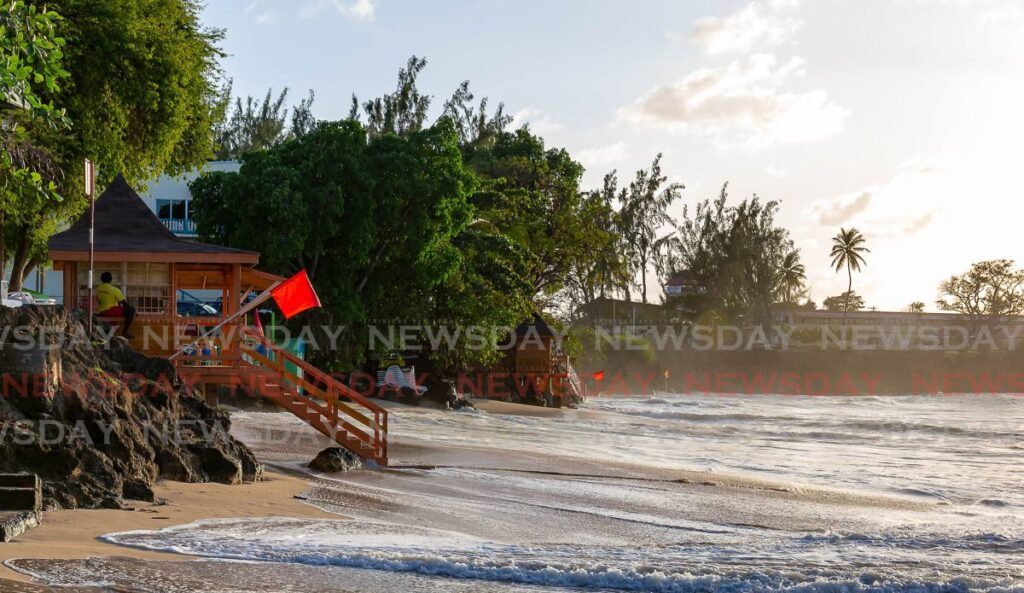THA reviews recommendations to tackle coastal erosion

SEVEN recommendations have been made to mitigate the effects of coastal erosion, particularly in the south-western part of Tobago, after a two-day seminar with over 20 stakeholders was held recently by the Tobago House of Assembly (THA). The seminar was attended by THA and Ministry of Works and Transport professionals, NGOs and other private engineering firms.
The forum, themed The Green Infrastructure for Coastal Protection, was facilitated by professors of the National Autonomous University of Mexico, Dr Valeria Chavez and Dr Rodolfo Silva. It was purposed to expose industry stakeholders to environmentally friendly or blended strategies and solutions that can effectively address the coastal erosion challenges.
Among the proposals are the installation of a rock revetment at ANR Robinson International Airport; the removal, replacement and modification of Sandy Point Groyne Field; construction of a rock revetment and boardwalk along the Milford/Pigeon Point Road; reopening of the link between wetland and sea to facilitate flushing of the wetland and greater opportunities for fisher folk; buried revetment and vegetative dune in front of the Heritage Pavilion; creation of a terminal Groyne on the main beach close to the existing jetty; and installation of buried revetment and vegetative dune on the North Beach.
Emphasis on the rehabilitation of the Buccoo Reef was also highly recommended. This would
see the implementation of the THA Draft Marine Park Bill, 2020; and the establishment of
a coral nursery. Other interventions are already in train by stakeholders.
Climate change specialist, Division of Infrastructure, Quarries and Urban Development
(DIQUD), Howard Robin, said, “The initiative is part of an overall consultancy that (coastal engineering firm) Smith Warner (International) is doing on behalf of the THA in respect to the coastal area that extends from Pigeon Point all the way to Milford/Sandy Point.
"It is an intervention that is expected to present a holistic approach to managing coastal erosion in that area and as part of that consultancy, we from the THA saw it extremely important to also educate technocrats, both in TT in respect to how we can use the ecosystem or use natural systems as well as the hard engineering to try to manage coastal erosion, and not just coastal erosion but anything happening in the marine space around Tobago.”
Robin added that it was paramount to engage a wide cross-section to share the data accumulated from the study, as all stakeholders have a responsibility to share in the management of the space.
Consultant representative and project manager, Edward Albada, said that this study was
the largest coastal study undertaken in the south-western region of Tobago. The data together with modelling and stakeholder engagement provided an understanding of the coastal processes and dynamics which led to the conceptualisation of solutions and detailed designs in anticipation of approval and construction.
“We’ve found that the Buccoo Reef itself dissipates around 70 to 80 per cent of all the wave energy that eventually hits the shoreline, especially in the Pigeon Point area. The Buccoo reef area therefore acts as a natural breakwater.
"Furthermore, we’ve been able to use those measurements into the calibration of models and what we have found is that the sand, all of the sand in the beaches along the Pigeon Point stretch, are being fed by sand that is actually degenerated on Buccoo Reef itself,” Albada said.
The findings show a loss of the beach width, which contributes to a loss of protection against episodic storm events and occasional hurricanes. Data suggests that the Buccoo Reef is not producing the volume of sand as in years past; the locations are therefore experiencing a sand deficit.
The THA executive is currently reviewing the proposals.
DIQUD said the public will be apprised of further developments.

Comments
"THA reviews recommendations to tackle coastal erosion"